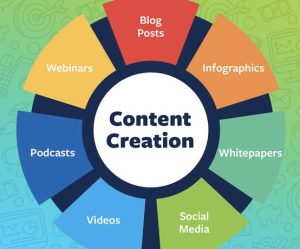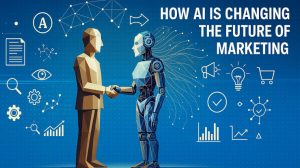The future of Branding : How AI is redefining creative identity
In today’s fast-paced digital era, where attention spans are shrinking and consumers quickly switch from one brand to another, building long-lasting brand value has become challenging. Brands now struggle to remain memorable, relevant, and emotionally engaging. The solution lies not only in creativity but also in the power of artificial intelligence
. What refers to creative identity
Creative identity goes far beyond a logo or color scheme. It is the emotional, visual, and verbal personality of a brand—how it looks, speaks, feels, and connects with people. Traditionally, creating this identity required agencies, market research, copywriters, and lengthy feedback cycles.
Artificial Intelligence Transforming The Future Of Branding
The biggest shift Artificial Intelligence has brought is in brand–customer communication. With the help of chatbots and real-time personalization, businesses can engage audiences more effectively.
Artificial Intelligence technologies like machine learning analyze customer preferences and behaviors, enabling more accurate strategies. Tools such as ChatGPT, Jasper, and Canva now allow marketers to generate taglines, logos, ad creatives, and prototypes in minutes. Artificial Intelligence also identifies aesthetic trends and ensures consistency across platforms—something that once took months of human effort.
Creative collaboration
Artificial Intelligence isn’t replacing designers, writers, or marketers—it is enhancing their work. Creative professionals use AI as a co-pilot to brainstorm faster, experiment with ideas, and develop prototypes more efficiently.
Making it more clear by presenting Real-World example
Coca-Cola launched an interactive campaign where anyone could generate original artwork using Artificial Intelligence tools like DALL·E for visuals and ChatGPT for text. Fans typed prompts such as “a tiger in space drinking Coca-Cola,” and Artificial Intelligence produced unique branded content. This turned customers into collaborators, blending imagination with brand identity.
•Involvement of Branding With Artificial Intelligence co-pilot
In the modern business landscape, staying authentic and innovative requires more than human creativity. Artificial Intelligence acts as a co-pilot—a collaborative assistant that supports brainstorming, designing, and brand strategy development. Like a co-pilot in aviation, Ar tificial Intelligence enhances efficiency without taking control away from humans.
Artificial Intelligence co-pilot meets Branding and Creativity
-
Content Generation
-
Design and Visual Identity
-
Marketing Campaigns
-
Product Personalization
Challenges Faced by Brands
With new technology come new responsibilities. As Artificial Intelligence becomes central , companies must ensure:
-
Authenticity: Avoid robotic or generic messaging
-
Ethics & Bias: Prevent stereotypes or misinformation
-
Human Touch: Keep empathy, creativity, and originality at the core
The future
Imagine a brand that evolves in real time with its audience—visuals that shift with trends, messages that adapt to moods, and campaigns that feel personal to every customer. This is the Artificial Intelligence-powered future of, where a brand isn’t a fixed symbol but a living identity that listens, learns, and adapts.
Efficiency in Content Creation and Distribution

Artificial Intelligence doesn’t just personalize content—it accelerates production. By analyzing data, Artificial Intelligence tools recommend effective formats and topics. From ad creatives to social media posts, Artificial Intelligence tools reduce costs and time while ensuring consistent quality.
-
Key Benefit: Faster production and smarter distribution
-
Outcome: High-quality, relevant content delivered quickly
Measuring Branding Success in the Age of Artificial Intelligence
Success in Artificial Intelligence-driven brand depends on data-driven insights. Brands now measure ROI, performance metrics, customer satisfaction, and loyalty to evaluate how Artificial Intelligence impacts growth and recognition.
Targeted Marketing Strategies

Artificial Intelligence allows brands to process massive data sets and identify consumer patterns. With these insights, companies design targeted campaigns that match customer interests, habits, and needs—ensuring marketing messages feel more personal and compelling.
What are Artificial Intelligence marketing tools?
Artificial Intelligence marketing tools are software platforms that integrate with LLMs and your existing marketing workflows, using MCP (Model Context Protocol), to help automate internal workflows for marketers. These tools can help you either create something new, using Artificial Intelligence or take your automation skills to the next level without needing to be an Artificial Intelligence Engineer. At first, many of these Artificial Intelligence tools seemed to just be using regular machine learning algorithms that had nothing to do with modern day Artificial Intelligence. But now, many of them leverage LLMs like ChatGPT, Claude, Gemini, or Grok, to give your existing workflows a layer of intelligence we have never seen before. It’s actually quite amazing.
10 Best Artificial Intelligence marketing tools
Here are some of the best tools businesses use today:
-
Gumloop – Artificial Intelligence automations
-
Surfer SEO – Content optimization
-
Notion Artificial Intelligence – Productivity
-
Jasper Artificial Intelligence – Copywriting
-
Lexica Art – Blog thumbnails
-
LALA Artificial Intelligence – Audio recordings
-
Crayo – Short-form video creation
-
Brandwell – SEO blog post generation
-
Originality Artificial Intelligence– Content detection
-
Writer.com – Team content writing
Final Thought
Brand has always been about strategy and creativity. Artificial Intelligence doesn’t replace that—it amplifies it. In the future, the most successful brands will combine human emotion with machine intelligence to build identities that are dynamic, authentic, and adaptive.
The future of branding isn’t just creative. It’s intelligently creative.
Harvard Business Review on Branding
Check out more blogs from the author – Click Here
Visit STABForge LinkedIn page – Click Here

